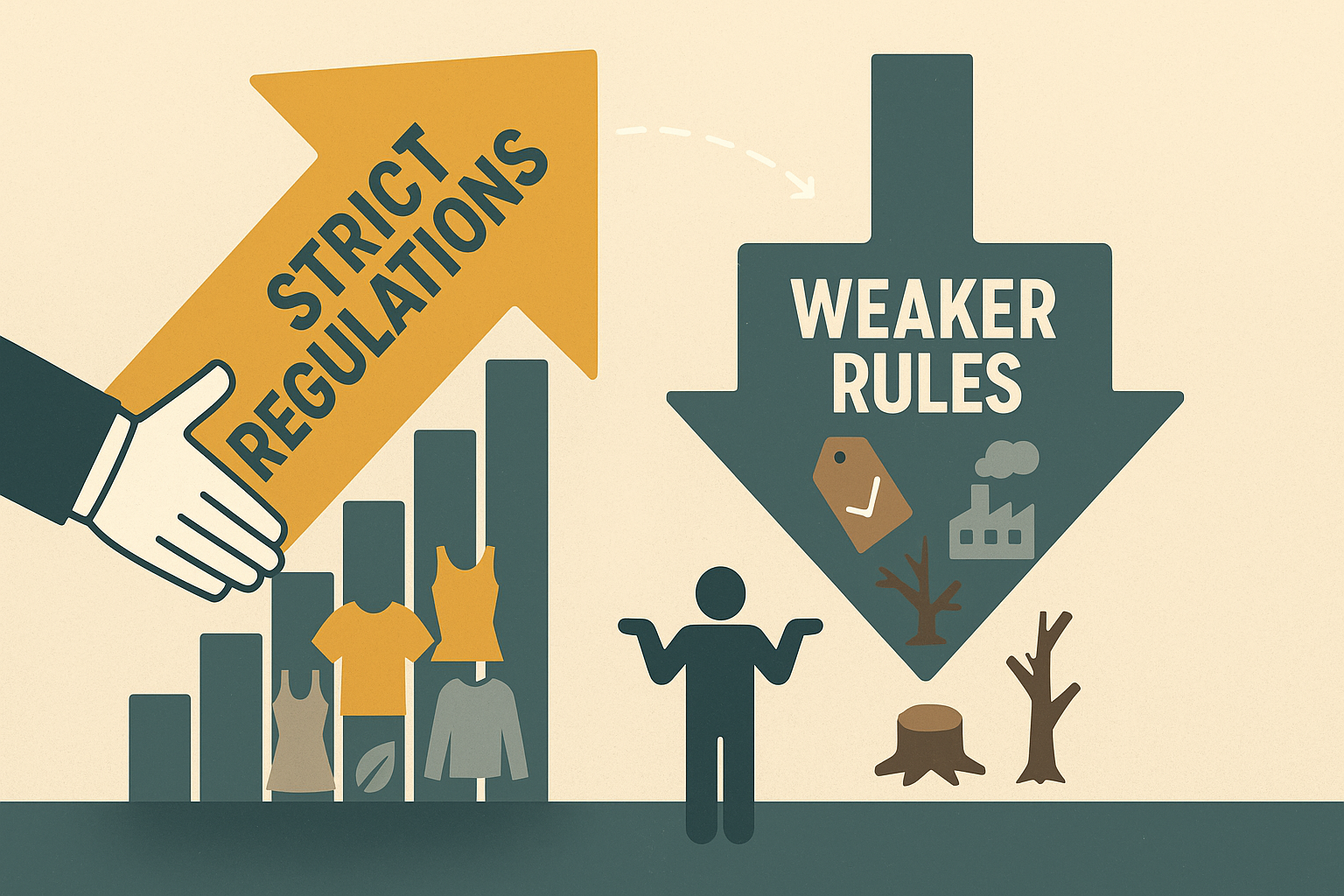Just a year ago, Europe’s fashion industry was preparing for sweeping sustainability regulations that promised to transform the way clothes are made, sourced, and marketed. Rules addressing deforestation, forced labour, carbon emissions, and greenwashing were set to reshape supply chains and product design. Today, many of those measures have been delayed, weakened, or withdrawn, reflecting a broader political shift and growing resistance to environmental, social, and governance (ESG) mandates.
From Ambition to Delay
The European Union’s initial plan included three major initiatives:
- Corporate Sustainability Due Diligence Directive (CSDDD) — addressing climate impacts, labour abuses, and human rights across entire supply chains.
- Regulation on Deforestation-free Products (EUDR) — ensuring goods sold in the EU are not linked to forest destruction.
- Green Claims Directive — curbing misleading environmental marketing.
Originally scheduled for phased implementation between 2024 and 2026, these measures have now seen deadlines pushed back and requirements scaled down, with the CSDDD’s scope reduced to cover only tier 1 suppliers — a significant retreat from earlier plans for full supply chain accountability. Critics warn this lets companies sidestep responsibility for the environmental and human rights risks that typically occur in raw material sourcing, far beyond the first tier of suppliers.
Political Climate and Corporate Lobbying
The European Commission frames the rollbacks as “simplification,” arguing they maintain climate goals while reducing the administrative burden on businesses. Commission President Ursula von der Leyen says the EU remains committed to climate neutrality by 2050, but stresses the need for “flexibility and pragmatism.”
However, advocacy groups point to heavy corporate lobbying. Research by non-profit Reclaim Finance suggests every adjustment in the Commission’s Omnibus simplification package aligns at least partially with industry demands. Measures have also eased under the Carbon Border Adjustment Mechanism, which taxes imports based on their emissions footprint — potentially impacting textiles in the next phase.
Deforestation Rules Watered Down
The EUDR, initially praised for treating all forests equally regardless of geography, has been diluted. Compliance deadlines have been extended, and focus shifted away from countries most associated with deforestation, including both tropical rainforest nations and major forestry economies such as Finland. Conservationists call this a significant compromise to one of the EU’s strongest environmental tools.
Green Claims Directive Stalls
The Green Claims Directive, which would have required companies to substantiate environmental claims with evidence, now faces withdrawal unless exemptions for microenterprises are added. Observers say this creates uncertainty for businesses that have already invested in compliance systems, while offering a reprieve to less responsible players.
Industry Impact and Global Parallels
The retreat in Brussels echoes similar dynamics in the US, where the proposed New York Fashion Act — aimed at imposing environmental and social due diligence on major fashion companies — remains stalled. Luxury conglomerates such as LVMH and VF Corp have engaged lobbyists, though their positions on the bill are undisclosed.
Shifting the Burden to Brands
In the absence of strict regulation, experts believe progress will depend on brands that have already embraced sustainability, driven by both consumer expectations and the need for resilient supply chains. Nicole Rycroft, founder of environmental non-profit Canopy, notes that for many companies, sustainability is “no longer just about regulatory compliance — it’s about resilience” and ensuring access to raw materials in the future.
While political headwinds may delay Europe’s regulatory agenda, the underlying framework for reform remains in place. “Whether it’s the end of this year, or four years from now,” says Rycroft, “there’s a sense it will come into effect in some way, shape or form.”








